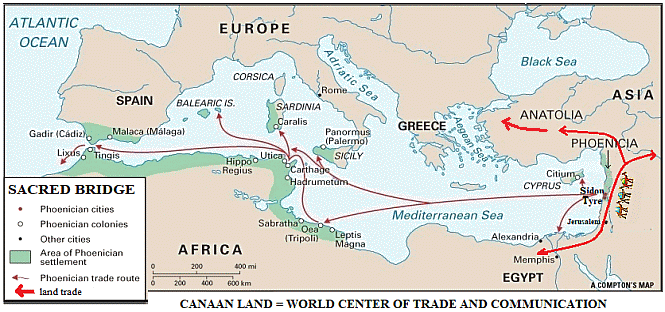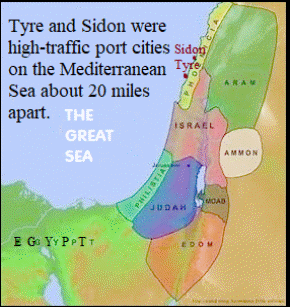
THE JUNCTION OF THE WORLD CIVILIZATIONS
Evidences: Prophecies #1
WHY CANAAN?
THE SACRED BRIDGE AND THE PHOENICIAN WORLD
Beginning a series on Biblical Prophecies
Abram's family left Ur of the Chaldees around 2000 BC to go “to the land of Canaan” (Genesis 11:31). God guided him to Canaan and promised to give that land to him through certain of his children but not until after the resident Amorites'i iniquity was full (Genesis 15:16). Contrary to some, Abraham was not the sole believer in the true God; nor did he invent monotheism. There were faithful believers of God living at the time and in the land of Canaan; e.g., subjects to Melchizedek, a mediator between man and the Most High God (Genesis 14:18). Gerar claimed to be a "righteous nation" (Genesis 20:4). Noah and his immediate family would have had an influence for hundreds of years after the memory of the Great Flood (Noah lived 350 years after the flood). After the tower of Babel the descendants of Noah were divided into the earth by nations (Genesis 10:32).
ABRAM IS GUIDED WEST INTO CANAAN. “And Abram passed through the land unto the place of Sichem, unto the plain of Moreh. And the Canaanite was then in the land. And the LORD appeared unto Abram, and said, Unto thy seed will I give this land” (Genesis 12:6, 7a).
WHY? Do we know of a reason why God would choose especially the land of the Canaanites for Abram? The world was out there and could there not be a parcel of land unoccupied if God just wanted them to have a home? But it was for inquityii? If people could be dispossessed because of their iniquity, would not God have had plenty of rebellious sinners in the Far East or those in the West, or in the North? For example, why not replace the Hittites in Anatolia or those that had settled in Europe or maybe the Far East? But the choice of Canaan was in the wisdom of God; it was in the center of the ancient world.
The NT apostle told the Athenians, “And he has made of one blood all the nations of men living on all the face of the earth, ordering their times and the limits of their lands, So that they might make search for God, in order, if possible, to get knowledge of him and make discovery of him, though he is not far from every one of us” (Acts 17:26b, 27, BBE). God wanted man to have access to the knowledge of HIMSELF. An internet blogger demanded, "Don't try and persuade me with ancient predictions; just give me a recent prediction and show me the proof of its coming true."
GOD'S WISDOM SELECTS THE HUB OF THE WORLD: “Ye are my witnesses, saith the LORD, and my servant whom I have chosen: that ye may know and believe me, and understand that I am he: before me there was no God formed, neither shall there be after me” (Isaiah 43:10). Abraham because of his faith had been chosen to have his family perpetuate the witness of knowledge of the true God, which faith was being replaced by the ignorance of polytheism. “For I have chosen him, so that he will direct his children and his household after him to keep the way of the Lord by doing what is right and just, so that the Lord will bring about for Abraham what He has promised him” (Genesis 18:19).
CANAAN, THE SACRED BRIDGE. The land of Canaan has been called the “sacred bridge,” a strip of land that connected the ancient empires of Egypt of the southwest and Mesopotamia of the northwest (Assyria, Babylonia, Persia and Parthia). God placed Israel in the midst of the trade routes between the historic land civilizations, in the sacred bridge, which incidentally also included the Phoenicians ports, the sea gateway to the western world.
The critical importance of this land bridge for gaining and maintaining power and wealth in antiquity is reflected in the constant struggle that went on between the rising regional powers to control the region for centuries. We can see the wisdom of God in locating the children of Jacob, who became the Keeper of the Law, in such a strategic location to control worldwide flow of information that would retain witness of the knowledge of God for humanity.

THE
JUNCTION OF THE WORLD CIVILIZATIONS
THE PHOENICIANS. I along with my peers learned about the Phoenician maritime empire while in public school in Tennessee. Civilization, I was taught, began with the Sumerians in the fertile crescent but spread out into the worldiii, particularly SW into Egypt. The Phoenicians were fundamental to world trading by moving people into the western Mediterranean and into the northern islands.
TYRE AND SIDON were two of the chief city-states of the "Phoenicians." These ancient places still exist, and Tyre's “250,000 inhabitants were ordered by (current) Israel to flee their homes this last week.” It is one of the world's great cultural treasures, with monuments dating back to Phoenician times 3,000 years before Christ.”iv The Phoenicians were the merchants of the Sea who established colonies throughout the Mediterranean, and beyond to Britain, and into the Atlantic. They were decended from Canaan, the son of Ham, the son of Noah (Genesis 9:18,25); Sidon was Canaan's oldest child (Genesis 10:15). Sidon and Tyre had established themselves along the coast of the Mediterranean Sea a few miles from one another. Sidon was initially comparatively “a great city” on the Sea ("Zidon", Joshua 11:8; 19:28) but Tyre eventually became the dominant of the two. “The Phoenicians have been referred to as the `middlemen' of culture due to the cultural transference which accompanied their trade.”v While other civilizations were competitive and extended their influence by war and conquest over land, the Phoenicians gained their power, wealth, and influence through their trade between Near East, Northern Africa, Spain, and Europe, especially between the period 1200 BC – 539 BC.

ASHER FAILS IN THEIR DUTY. But Israel disobeyed God and did not remove all the Canaanite nations. It was the Israel tribe of Ashervi who was given direct responsibility for the western shores of the Phoenicians which included Tyre and Sidon. “And the fifth lot came out for the tribe of the children of Asher … even unto great Sidon; And then the coast turneth to Ramah, and to the strong [fortified, LXX] city Tyre; and the coast turneth to Hosah ...” (Joshua 19:24-29).vii Tyre was well fortified when Israel arrived in Canaan during the fourteenth century BC. Unfortunately, Asher failed in their duty to conquer the seacoast and remove the Phoenicians as commanded. “Neither did Asher drive out the inhabitants of Accho, nor the inhabitants of Sidon, nor of Ahlab, nor of Achzib, nor of Helbah, nor of Aphik, nor of Rehob: But the Asherites dwelt among the Canaanites, the inhabitants of the land: for they did not drive them out” (Judges 1:31-32). Consequently, Asher's number and presence among the nation Israel fades. But what is worse, the eventual influence of the princess of Sidon, Jezebel, almost single handed is responsible for the eventual destruction of both northern Israel and the southern kingdom of Judah. Bad choices produce bad consequences.
ASHER FAILED TO POSSESS THE COAST. “In the centuries after 1200 BC, the Phoenicians [instead of Asher-gw] became the major naval and trading power of the region.”viii Sidon consequently oppressed Israel during the period of the Judges (10:12) although God delivered them. Meanwhile, Tyre became somewhat of a capital to the Phoenician "empire" after the 11th century BC. It was a flourishing commercial center noted for its purple dyestuffs and rich, silken clothing.ix It was at this time that the Phoenicians instead of Israel established commercial outposts throughout the Mediterranean (to Spain and beyond); the most strategically important colony being Carthage in Northwest Africa, which incidentally was an eventual rival to upcoming Rome. What an opportunity that Asher missed for the Lord! God used the Phoenicians instead of Asher.
ASHER IS OUR WARNING. “Know for a certainty that the LORD your God will no more drive out any of these nations from before you; but they shall be snares and traps unto you, and scourges in your sides, and thorns in your eyes, until ye perish from off this good land which the LORD your God hath given you” (Joshua 23:13). If we obey God's commandments for us, He will make us prosper. If not, then our bad choices will become our demons to cause us to perish.
Next: God's knowledge includes divine predictons that are fulfilled hundreds of years afterwards.
-- Gaylon West
Editors: Janie Ruth Ward; Mary Lou WestTHROW OUT THE LIFELINE
website
i Amorites (Mar.tu "Westerners"); people living west of Ur of the Chaldees and the River Euphrates. - https://en.wikipedia.org/wiki/Amorites.
ii “Iniquity.” H5771. “perversity, that is, (moral) evil: - (translated as) fault, iniquity, mischief, punishment (of iniquity), sin” (Strong's Dictionary).
iii The corroborated history is consistent and parallel with Bible history.
iv https://www.irishtimes.com/news/beleaguered-city-of-tyre-has-a-rich-ancient-history-and- heritage-1.39548
v https://www.ancient.eu/sidon/
vi God promised all of Canaan to Abraham's descendents dependent upon their iniquities: “But in the fourth generation they shall come hither again: for the iniquity of the Amorites [name applied to those people to the west of Ur *] is not yet full” (Genesis 15:16). *https://www.ancient.eu/amorite/
vii “Asher.” “The Egyptians in the 1300s BC mentioned the Land of "Aseru" meaning Asher which in their terminology encompassed the Israelite Galilee, the area of Tyre, Lebanon, and reached to Kadesh on the Orontes River in northern Syria and beyond (Slouschz p.60 Grintz p.178). Asher may have had an especial concentration near Antioch on the Orontes.” “Asher was there.” --https://hebrewnations.com/articles/tribes/asher1/asherh1.html#a1
viii https://en.wikipedia.org/wiki/Phoenicia
ix Hence, the name “Phoenicians”: “people of purple.” https://www.yourdictionary.com/tyre

|